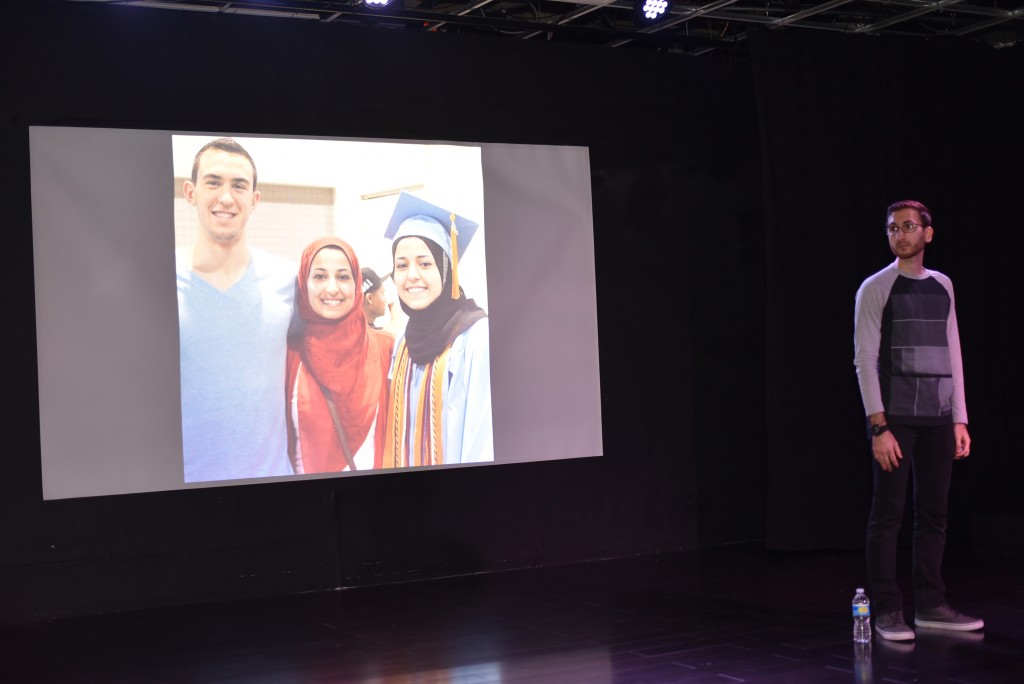
Mohammad Moussa (photo by Nida Allam)
Q: Tell me more about “Shattered Glass,” a performance that you wrote in tribute to your late friends Deah, Yusor and Razan that you will be performing at UNC in February for the Process Series.
A: “Shattered Glass” is a multimedia spoken word performance about the Chapel Hill shootings. On Feb. 10, 2015, my friend Deah Barakat, his wife Yusor Abu-Salha, and her sister Razan Abu-Salha were murdered in their home. In the aftermath, people around the world were left with many questions. Who were Deah, Yusor and Razan? What does it mean to lose your child, your sibling or your friend? How as a community do we deal with unimaginable tragedy? And after our nightmares come alive, how do we remember how to dream? In this piece the audience goes through a journey of loss, emptiness, comfort and growth as we try to find some answers.
“Shattered Glass” is a 45-minute performance that fuses together poetry, images and videos. The piece is more than just a poem, a movie or a play, but a combination of all of these things. The goal is to continue the conversation about the tragedy and to reflect on what this means for our communities. The piece is also a commemoration of the victims and their legacies.
Q: What makes spoken word poetry such a powerful form of storytelling? Why did you want to use this medium to share their story?
A: Poetry is a transformative art form that compels people to think, to reflect and to engage. It’s a medium that has followed human history due to its powerful qualities. Spoken word — the tradition of performing your poems to an audience — energizes listeners and calls them to action. Spoken word helps us tell dynamic and relatable stories, and in turn stories help us connect to and understand one another. By adding videos and images, the audience gets to interact with the subject matters in a more concrete way. The combination of multimedia and poetry forms an animated and expressive medium.
Q: You will be performing your piece on the anniversary of their deaths — how do you hope this will continue to spark a conversation in the community about this tragedy?
A: I hope that through this piece the legacy of Deah, Yusor and Razan continues to inspire others. I also hope that this work provides a platform to engage our community on topics that are oftentimes not easy to navigate. By providing a human glimpse into loss, suffering and discrimination, perhaps we can more easily and honestly tackle these issues.
I hope that by understanding the amount of pain and loss that the community has gone through, we can ask ourselves “How can I make sure something like this never happens to anyone else? How can I make sure no one goes through this pain again?” We have to think about the steps we can take to reduce and remove hatred and violence. These conversations are ones that we should have together as a community, and this performance is an opportunity to gather us all in one place to talk and think about these realities.
Q: Are you excited about reuniting with your “Poetic Portraits of a Revolution” collaborators for this Process Series festival?
A: I’m super excited about collaborating with Will McInerney and Kane Smego once more. It’ll be over five years since our last performance at the Process Series, where the three of us, along with project photographer and videographer Sameer Abdel-Khalek, worked on a multimedia performance about our trip to Egypt and Tunisia for “Poetic Portraits of a Revolution.” We had documented the 2011 uprisings through poetry, images and videos, and created a piece called “Snapshots” where we shared stories from the people on the ground. Will and Kane are phenomenal artists, and we’re all great friends. I always learn a lot from them when we collaborate, so I’m looking forward to having that opportunity again during this festival.
